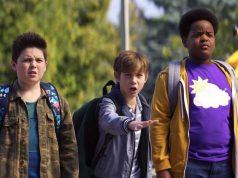Mel Gibson’s latest troubles began just as “The Beaver” was finishing production, but if you didn’t know that you’d think the film was devised as a rehabilitation project. It turns out to be the perfect reintroduction for an audience that may be wary of the once-beloved actor.
Gibson plays Walter Black, a man in deep pain. He’s clinically depressed, prone to alcohol abuse, and filled with self-loathing. He has tried every kind of therapy and medication, orthodox and unorthodox, Western and Eastern, to no avail. He sleeps most of the time, can’t carry on a conversation when he’s awake. He’s on the verge of finally ending his life when he finds a beaver puppet in the trash and, on a whim, hangs onto it. Then the beaver starts speaking.
OK, not exactly. Walter doesn’t think the beaver is real or anything like that. He’s depressed, not crazy. (There is a fine line.) He controls the puppet and provides its avuncular, Michael Caine-ish voice, and is perfectly aware that he is doing this. But through this character, Walter can communicate with people. The Beaver speaks for Walter in ways that Walter couldn’t. The Beaver is therapeutic.
Walter’s wife, Meredith (Jodie Foster, who also directed), finds all of this rather insane, of course, but she can’t deny the short-term results. Their young son, Henry (Riley Thomas Stewart), readily accepts the Beaver as Dad’s kooky new character, and happily spends some much-needed father-son-puppet time with him (them?). On the other hand, Walter and Meredith’s older son, Porter (Anton Yelchin), a high-school senior, is making a concerted effort to be nothing like his father. As far as he’s concerned, this latest bit of madness is just another reason to stay focused on that goal.
The film, written by Kyle Killen, is remarkably poignant and heartfelt, using its ridiculous-sounding premise to explore serious issues with real tenderness. While it has light moments, it is not a comedy, and that might be the gutsiest thing about it. Movies have a notoriously hard time depicting depression realistically; “The Beaver” chooses a mechanism that works, and Foster directs it sensitively.
Porter, who earns money writing papers for fellow students by adeptly mimicking their writing voices, doesn’t want to be like his father. He hates his father — but Walter hated his father, too, which makes Porter and Walter alike. The movie is about Walter repairing himself so that he can repair his relationships with Porter, Meredith, and Henry, and about Porter doing the same. Puppet therapy might seem drastic, but why? According to the film, “Starting over isn’t crazy…. Crazy is pretending to be happy.” It’s hard to argue with that.
All of this is fine by itself. Another good actor could have played Walter and made a film that was just as effective. But Gibson’s presence gives it an added jolt: It’s impossible not to compare him to Walter, to note their similar self-destructive tendencies. We hear very little from Walter; nearly everything he says is in the film is through the Beaver — which means we’re seeing Gibson play a character who is playing a character. That extra degree of separation is extraordinarily useful at this point in Gibson’s career. Too many of us would find it hard to enjoy a movie that was all Gibson, all the time, all in your face. But in the role of a sad, damaged man who takes on the persona of a lovable fictional character, Gibson earns our sympathy.
Certain aspects of the story are perhaps over-simplified. The people in Walter’s life, including his employees (he’s CEO of a toy company), go along with the puppet business more readily than is plausible; even a brief scene or two of reticence and “the boss has lost his mind” whispers might have helped. Porter’s relationship with his class valedictorian (Jennifer Lawrence) is likewise underdeveloped, especially the parts dealing with her own troubled past. But, as always, I’d rather a movie be too short than too long. “The Beaver” navigates its tricky tone and subject matter in a sweet, memorable fashion.
B+ (1 hr., 30 min.; )





